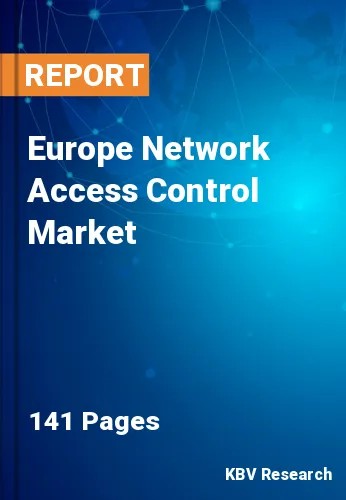The Europe Network Access Control Market would witness market growth of 25.0% CAGR during the forecast period (2023-2030).
The market is expanding across various industries, including IT & telecommunication, BFSI, healthcare, government, and manufacturing, as a result of recent trends like hybrid work cultures, bring-your-own devices (BYOD) policies, and remote working scenarios. Additionally, organizations are using technology-enabled devices like the Internet of Things (IoT) more and more, which poses a risk of providing access to unwanted and dangerous devices and applications. In order to recover control over their network, allow & restrict access, and keep track of the security postures of organizational devices, businesses are implementing network access control systems & solutions. This helps them stay safe against data theft, cybercrimes, and viruses.
The increasing availability of unemployed and third-party resources increases the demand for the NAC solution. It enables users to assess whether the devices are sufficiently compliant while lowering the costs and time involved in authenticating and authorizing networks & devices. Cybercriminals have recently used highly sophisticated tactics to target weaknesses in various sectors, including the BFSI, IT, and governmental institutions.
Organizations in the public & private sectors are increasingly the target of cyberattacks in Europe. The significance of effective cybersecurity measures has come to light due to high-profile data breaches and cyberattacks. Granular access controls, user and device authentication, the use of NAC solutions, and the detection and mitigation of security risks all contribute to stronger network security. The financial industry, for instance, abides by rules like the Markets in Financial Instruments Directive (MiFID II) and the Payment Services Directive (PSD2). For example, the European Union Medical Device Regulation (EU MDR) is followed by healthcare organizations. By imposing access rules, safeguarding sensitive data, and keeping audit trails, NAC solutions assist in adhering to various sector-specific standards. All these aspects showcase the growth prospects for the regional market.
The Germany market dominated the Europe Network Access Control Market by Country in 2022, and would continue to be a dominant market till 2030; thereby, achieving a market value of $931.4 million by 2030. The UK market is experiencing a CAGR of 24% during (2023 - 2030). Additionally, The France market would showcase a CAGR of 26% during (2023 - 2030).
Based on Deployment, the market is segmented into Cloud, and On-premise. Based on Offering, the market is segmented into Hardware, Software, and Services. Based on Enterprise Size, the market is segmented into Large Enterprises, and Small & Medium Enterprises. Based on Vertical, the market is segmented into BFSI, IT & Telecommunication, Retail, Education, Healthcare & Dental, Energy & Utilities, Manufacturing, Government, and Others. Based on countries, the market is segmented into Germany, UK, France, Russia, Spain, Italy, and Rest of Europe.
Free Valuable Insights: The Worldwide Network Access Control Market is Projected to reach USD 14 Billion by 2030, at a CAGR of 25.3%
The market research report covers the analysis of key stake holders of the market. Key companies profiled in the report include Cisco Systems, Inc, Huawei Technologies Co., Ltd. (Huawei Investment & Holding Co., Ltd.), IBM Corporation, Broadcom, Inc., VMware, Inc., Hewlett Packard Enterprise Company, Microsoft Corporation, Juniper Networks, Inc., Sophos Group PLC (Thoma Bravo) and Fortinet, Inc.
By Deployment
By Offering
By Enterprise Size
By Vertical
By Country
Our team of dedicated experts can provide you with attractive expansion opportunities for your business.

